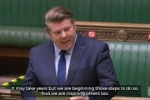To mark International Men's Day, a debate was held in the House of Commons. Dean took part in it. To see his contribution, watch the video above. You can read the full transcript below.
Dean Russell (Watford) (Con)
I also thank my hon. Friend the Member for Don Valley (Nick Fletcher) for his work in securing the debate. I must say that I am a little disappointed. I would have hoped that, on a debate about half the nation, the Benches would have been it bit more full. Perhaps that is a sign of what the challenge is, because when we talk about men’s issues, we often do not talk about men’s issues. I am afraid that in a debate where we should be celebrating all the immense impacts of men across society, my speech, like others’, will focus on mental health and suicide and how we should be talking more and encouraging men to talk more about the challenges they face. Men contribute so much to society. I wish I was here with full Benches talking about the immense impact that men have for good in our society, just as we would if this were International Women’s Day and we were rightly celebrating the impact of women on us all.
I want to start with a point I have mentioned many times in this place, which is about mental health and the need for greater support. I had a 10-minute rule Bill, which I will try to bring back at some point, which aimed to ensure that mental health first aid awareness is part of physical first aid in the workplace. One challenge is that people, men in particular, do not know how to talk about issues they might be facing. They do not have to wait until the worst time, when it is affecting them in a way that is visible; they should be able to talk at an earlier stage about the challenges they might be facing.
One part of the challenge we have in society is the idea that men are supposed to be all strong. The hon. Member for Rutherglen and Hamilton West (Margaret Ferrier) mentioned the idea of the physical nature that men had to have—the Arnold Schwarzeneggers and the Sylvester Stallones that I grew up with in the 1980s. Ultimately, men had to be strong and not show weakness. As a man it was weak to show weakness. Actually, I say the opposite: that to show a weakness, to talk about a weakness and to ask for help is the greatest strength to have. The challenge for many is that they are not asking and are not looking for support, because they do not always know where to go for it. They do not know who they can trust, who will not mock them or ask them questions about things they do not feel comfortable talking about.
That has been exacerbated—this was mentioned earlier—by social media. Andy Warhol said that in the future everyone would have 15 minutes of fame. I say, sadly, it is now 15 minutes of shame. When you raise a concern, you get mocked for it. If you are not popular, then that is somehow a reason why people can attack you. They can say horrid things to you and move on to the next person. We see it in politics. I call it sniper politics: the idea that you take out one individual, Toggle showing location ofColumn 915whether a politician, a celebrity or someone in the community, with a hate pile-on. People are vile to a person in the moment and then move on to the next victim and the next victim. Is it any wonder, then, that men and women—in the context of this debate, men in particular—feel awkward raising concerns and talking to their friends in a way that might be shared or laughed at?
It does not have to be that way. There are a lot of opportunities for men to take control of their lives by asking others to help them. One is by forming stronger networks and by having a society where we help each other and listen to each other. That is why debates like this are so important and why I applaud my hon. Friend the Member for Don Valley, especially after the pile-on he experienced last year for making comments in this place. From being attacked in such a way, he has come back today, in a place that could have been quite vulnerable and open to attack, to say, “No, I do believe in this. This is a strong place to be in.” That is a strength.
Sometimes it is hard to go against the grain. Sometimes it is hard to talk about issues that others do not always agree with. That is why this place is so important. That is why I would have loved the Benches to be full of people talking about the challenges they face. We are, ultimately, whether people like us or not, role models. Within society, we have to look at how role models play a part, whether they are teachers in schools, sports people, doctors, or a nurse down the road working at a care home. All those people, across society, are people that young kids, boys and girls, can look up to and see a career option. That can break down barriers. When people think of nurses, they should think of men and women. When they think of care home workers, they should think of men and women. They should not just think of a particular type of role for a particular type of person.
We can also think about places such as gyms. In my Watford constituency, I visited NRG gym recently and I have visited one called CageFit. I heard amazing stories of people who do mixed martial arts fighting. Thankfully, I did not get in the ring—I do not think I would have fared too well—but people talked about the impact of going to such gyms. One of the gentlemen I was chatting to said that once people learn that they can fight in the ring for money, they do not want to fight on the streets for free. That was really about antisocial behaviour and kids in certain areas or in difficult circumstances perhaps being encouraged to join gangs. By joining a gym, they can be around other positive role models and learn that they have value in other ways, through their physique or mental capacity.




